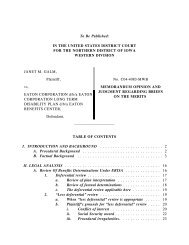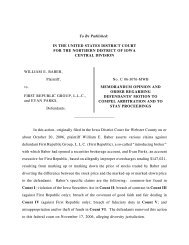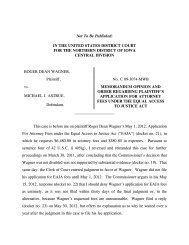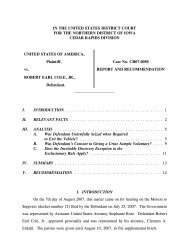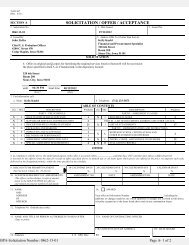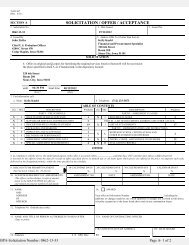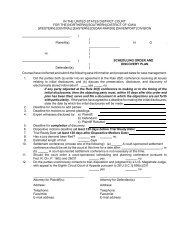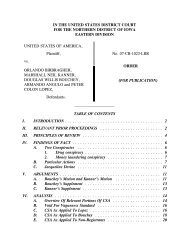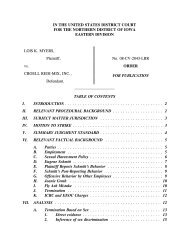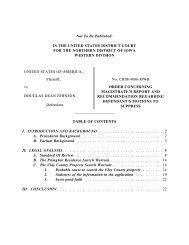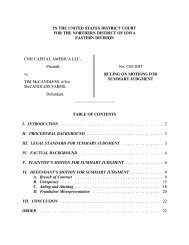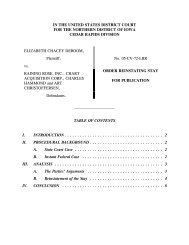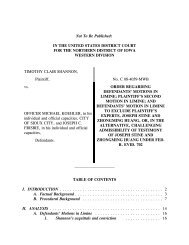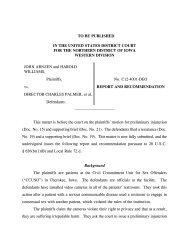Trial Setting Order for Bench Trials - Northern District of Iowa
Trial Setting Order for Bench Trials - Northern District of Iowa
Trial Setting Order for Bench Trials - Northern District of Iowa
Create successful ePaper yourself
Turn your PDF publications into a flip-book with our unique Google optimized e-Paper software.
A witness testifying by deposition must be listed in the witness list with a designation that<br />
the testimony will be by deposition.]<br />
A. Plaintiff(’s)(s’) witnesses [list name, substance <strong>of</strong> testimony, whether any<br />
party objects to the witness, and the nature <strong>of</strong> and grounds <strong>for</strong> any objection]:<br />
1.<br />
2.<br />
B. Defendant(’s(s’)) witnesses [list name, substance <strong>of</strong> testimony, whether any<br />
party objects to the witness, and the nature <strong>of</strong> and grounds <strong>for</strong> any objection]:<br />
1.<br />
2.<br />
All parties are free to call any witness listed by an opposing party. A party listing<br />
a witness guarantees his or her presence at trial unless it is indicated otherwise on the<br />
witness list. Any objection to the <strong>of</strong>fer <strong>of</strong> testimony from a witness on the witness list is<br />
waived if it is not stated on this list.<br />
IV. RESTRICTIONS ON WITNESSES: A witness who may testify at the trial<br />
or at an evidentiary hearing must not be permitted to hear the testimony <strong>of</strong> any other<br />
witnesses be<strong>for</strong>e testifying, and is excluded from the courtroom during the trial or hearing<br />
until after the witness has completed his or her testimony, unless exclusion <strong>of</strong> the witness<br />
is not authorized by Federal Rule <strong>of</strong> Evidence 615 or unless the court orders otherwise.<br />
A witness who is excluded from the courtroom pursuant to this paragraph also is prohibited<br />
from reviewing a verbatim record <strong>of</strong> the testimony <strong>of</strong> other witnesses at the trial or hearing<br />
until after the witness has completed his or her testimony at the trial or evidentiary hearing,<br />
unless the court orders otherwise.<br />
Unless the court orders otherwise, after the commencement <strong>of</strong> the trial or an<br />
evidentiary hearing and until the conclusion <strong>of</strong> the trial or hearing, a witness who may<br />
testify at the trial or hearing is prohibited from communicating with anyone about what has<br />
occurred in the courtroom during the trial or hearing. If the witness does testify at the trial<br />
or hearing, after the witness is tendered <strong>for</strong> cross-examination and until the conclusion <strong>of</strong><br />
the witness’s testimony, the witness is prohibited from communicating with anyone about<br />
the subject matter <strong>of</strong> the witness’s testimony. A witness may, however, communicate with<br />
his or her attorney about matters <strong>of</strong> privilege, and may communicate with anyone if the<br />
right to do so is guaranteed by the United States Constitution.<br />
These prohibitions do not apply to the parties. An attorney who may call a witness<br />
to testify at trial must, be<strong>for</strong>e the trial, advise the witness <strong>of</strong> these restrictions.<br />
3



